- Home
- Amanda Hartford
The Sea Turtle Spell
The Sea Turtle Spell Read online
Pentacle Pawn: The Beginning
The Sea Turtle Spell
Amanda Hartford
Nineteen Cents Press
For Nancy Richardson Williams, who knows where the bodies are buried.
Contents
John
Chapter One
Chapter Two
Chapter Three
Chapter Four
Chapter Five
Chapter Six
Chapter Seven
Chapter Eight
Chapter Nine
Chapter Ten
Chapter Eleven
Chapter Twelve
A note from Amanda Acknowledgments
Intellectual property notice
Next in Pentacle Pawn: The Blue Amber Spell
John
I was the one who found my husband's body. I almost tripped over him.
I’d Ubered back to my family home on Royal Street a little after ten, after a few casual drinks at an oyster bar on the other side of the Quarter, catching up with a former colleague. There are no clubs or restaurants in our block, only retail shops that close by nine, so the foot traffic around our building gets lighter as the evening wears on. Our neighborhood is generally safe after dark and heavily patrolled – nobody wants to jeopardize all those tourist dollars. Even so, I'm always aware of my perimeter when I step out onto the sidewalk.
As far as I knew, John was upstairs. He had planned to spend the evening with a Guinness and a book in the family library. I remember that I was smiling as I emerged from my rideshare. My mind was on getting upstairs and distracting John from that book.
I didn't see my husband lying across the threshold until I stepped into the alcove. The police said later that the LED bulb above the front door was unscrewed, but I didn't notice it. John was facing the door with his knees pulled up to his chest. His hands were laced together over his head, his elbows pulled tight together to protect his face. It was a defensive position, as if someone had been kicking him.
I heard my cousin Aaron pounding down the staircase from the apartments above.
"Oh my God!" he gasped, bending over John. "What happened?"
I was sobbing. All I could do was shake my head. "I don't know, I don't know. Help him!"
Aaron had already dialed 911.
"Is he breathing?" I shrieked. "Oh my God! Is he breathing?"
Aaron wouldn't answer, and he wouldn't look at me.
Sirens were coming.
♦
John Spencer was not supposed to be dead. He was only 42. He worked out, he watched what he ate, he slept his full seven hours every night. He was always the grown-up. John was a sportswriter, a brilliant wordsmith who traveled with professional franchises and covered big-dollar college teams. His stories read like music, but that meant that his days and most evenings were very structured. John lived a simple life in a world of statistics and deadlines.
Me? Not so much. I resolved a long time ago to live every minute of every day. I loved that man dearly, but it irked me that, whenever we went out to supper, he could just sit there and watch me plow through my Bananas Foster and never even ask for a bite. I mean, Laissez les bons temps rouler, right?
My life is all about magic. After all, I'm a witch.
I'm Marguerite Flournoy, but everybody calls me Maggie. My family operates Pentacle Pawn here in New Orleans, in a shop at the back of this house where my family has lived for generations. I'm a physicist by training and a skeptic by nature. Having one foot in the scientific world and the other in magic gives me a unique perspective on things. So, in the few minutes before the paramedics arrived, and before the shock of John's death could close me down, I forced myself to take a close look at his body.
It’s funny what you think about at times like this. What stood out for me was that John was wearing a single red rose in his lapel. Odd, I thought: John never wore boutonnieres.
I didn't want to disturb the scene, but I touched his cheek and found that he was already growing cold. Despite his defensive posture, I saw no blood or bruises. I felt a vaguely electric tingle, the residue of a potent spell. This was not your usual mugging. John had been killed with magic.
But who would've wanted to hurt John? He wasn't a threat to anybody. He had no talent for the craft, and everybody in this house loved him. Right?
As the paramedics pulled up to the sidewalk, the terror on John's face burned itself into my memory. If this death had been done by magic, then I needed to absorb the fact that someone inside my safe haven had a hand in it.
Both paramedics were ridiculously young; they looked like they were barely out of high school, but they went right to work. I found myself shut out of their efficient circle.
I stood on the sidewalk and watched them roll John out of the alcove and place him flat on his back on the sidewalk. The paramedics methodically opened boxes of equipment as they spoke to each other in medical shorthand. Aaron lurked silently in the doorway, watching.
A small crowd formed around us. It was street theater, and they jostled for the best views. I wanted to scream at them, to tell them to go about their business. I wanted to call them vultures, feeding off of other people's misery. But I never took my eyes off of John, and I said nothing.
It was over very fast. An ambulance pulled up, and the paramedics loaded John inside. I started to climb in, but they closed the doors and pulled away, leaving me standing on the sidewalk.
I found Aaron at my elbow. He glanced at his phone. "Our ride will be here in five. I'll go with you," he said. "You shouldn't be alone."
People say that they remember these tragedies as a blur, but every moment of that night stands out for me in bright bursts: the short, noncommittal responses from the nursing station, Aaron and me squirming in uncomfortable chairs in the waiting room for hours, the crisp creases in the ER doctor's surgical greens when he came out to talk to me, the exact words he said.
"I'm sorry, Mrs. Spencer – he was gone before he reached us. You have our sympathies for your loss."
I think now that the doctor must have practiced that line a thousand times in medical school, but to me his words were fresh and they cut deep. John was gone.
There's a ritual to these things. The bureaucracy is in charge of death. Reports must be written and documents filed. People who die suddenly or alone are not exempt. Unattended deaths are brought back into the system by autopsy.
It was hard for me to bear the notion. John wasn't vain, but he was proud of his body. An autopsy felt like a violation, but I needed to know how John had died. Still, I was pretty sure that medicine had no answers for me.
The emergency room doctors had no clue. John's defensive posture in the doorway suggested that he had been assaulted, but there were no external injuries – not even a bruise from when he fell. There was no sign of heart disease, no brain hemorrhage. The toxicology screen was clean.
The doctors were stumped. The cause of death was listed as heart failure, simply because when someone dies their heart stops. The police, having no other clues, were happy to accept that explanation.
But I knew the truth. John was not killed at our door. John was killed by the door. And I needed to know why.
Chapter One
Daisy was the one who came to my room to comfort me after Aaron and I rideshared back to Royal Street. Daisy Murphy is a force of nature. More accurately, she is a conduit. She is able to tap into the ebb and flow, not so much to bend it to her will, but to apply it and amplify it in ways that sometimes even she barely understands.
From her Huguenot mother, the venerable Marie-Eglise, she got the name Marguerite. I'm named for that grandmother, too, which is how I ended up Maggie. We call my aunt Daisy, because, well, Marguerite is the Fre
nch name for the flower, but it's too much of a mouthful for everyday use. It's the only nickname she will stand for: not Margie, not Meg, and absolutely not Peggy. So, Daisy, it is.
From our Norse and Celtic ancestors on her father's side, she got a wicked temper and dark copper hair, now shot through with silver. Her hair may have mellowed over time, but even now in her seventies, her temperament is still original strength.
Daisy is my role model for aging, not so much gracefully as strong. She has no patience with my occasional junk food binges, and absolutely cannot understand why I would ever ditch a yoga class. She was into natural foods and holistic healing before they became trendy; she just calls it common sense. I suspect she will outlive us all.
Aunt Daisy has been my confidant and protector my entire life. She gets me. I guess it's because she never married, so she never actually had to be an adult.
My mother Hazel and I ... That's a whole other story. My mother has always been determined that I will be a proper lady, in the Edwardian sense but also in the development of my craft. Growing up, it was as important to Hazel that I be able to set a formal table as it was that I master the spell to cure hiccups. I absolutely knew that she loved me and meant the best for me. But Pentacle Pawn deals with life and death every day, and she needed for me to be ready.
As a teenager, I chafed under her expectations. Her standards were impossibly high, and it was abundantly clear when I failed to meet them. I envied my friends who only had to deal with schoolwork and the usual family squabbles. They never had to cope with a kangaroo that they had accidentally materialized in Daisy's herb garden, or deal with my mother in the aftermath.
I knew my mother meant well, but the bonds were too tight. I dreamed of escape.
My most vivid memory of my childhood in New Orleans is of sitting on the first-floor gallery of the house on Royal Street, fascinated with the tourists and the traffic on the street below me. I must've been about 11, right around the time I realized that my home life was very different from that of my friends. I remember a zydeco pickup band was wailing away at the far corner of the street and everybody down there was dancing. But I couldn't hear the music because Hazel was practicing.
My mother was, and is, a concert pianist. She plays with orchestras all over the South, and that means she must constantly rehearse and refresh her repertoire. That big old house is always filled with classical music.
On this afternoon, I can hear her downstairs in the front parlor, practicing arpeggios that wash over me in waves. She owns the air. I watch the tourists coming and going. It occurs to me that they are here for this moment but will soon go back to their own realities, their real homes. I fight the urge to run and run and never stop.
But if you are a Flournoy, Pentacle Pawn is your life's blood. I am skilled in my craft. We are traditional witches; what powers we have are based on genetics, not superstition. The family is not particularly flamboyant – well, except for Daisy, of course. Skill and restraint: those were the lessons of my childhood.
So I didn't expect my mother to be there for me on that dreadful night that John died, but Daisy was. She always is. She just let me cry, holding my hand until I could catch my breath again.
"Why?" was all I could say between sobs. "Who would've done this?"
"I don't know, my love. But we're going to find out."
There was no sleep for me the night after John’s murder. Daisy stayed with me until 2 AM, petting and soothing me but I could not be consoled.
I stayed in bed until noon the next day, unable to face the prospect of arranging John's funeral. To do that, I would have to admit that he was dead – and I was in no way ready for that. I dozed on and off through the day, hearing the family tiptoeing around in the hall outside my door.
The next morning, my mother had had enough. I skipped breakfast, so she brought it on a tray. I smelled chicory coffee and burrowed out of my duvet. My mother sat at the foot of the bed, watching me chow down on Daisy's Belgian waffles. I could hear tourists outside on the sidewalk; their happy chatter cut through me like a knife.
"I know what you're going through," my mother said. She knew no such thing. She and my father had enjoyed a comfortable marriage, but nothing like the bond between John and me, I self-righteously told myself.
"I understand that you want to hide from the world right now," Hazel was saying, "but the best thing for it would be for you to get back on the bicycle."
I wanted to scream at her, to tear her eyes out. I wanted John back.
She took one look at my face and retreated.
A few minutes later, Daisy appeared. "Your mother means well," she said quietly.
"No, she does not."
Daisy gave me her sweet smile. "You and I both know what you've lost." She put her arm around me. "But is this what John would want for you?"
I was paralyzed by the thought of going downstairs. It hadn't even been a day yet. There would be questions and discussion and pitying looks. "I'm not ready," I said.
Daisy squeezed my shoulders. "You're stronger than you think." And she left me to get dressed.
Chapter Two
An hour later, Hazel, Daisy and I sipped sweet tea on the back veranda and waited for the first customer of the day.
From the outside, the Flournoy building appears to be just another well-maintained building in the French Quarter, with businesses at street level and apartments above. My widowed mother Hazel and her sister Daisy grew up there, and two of the apartments are now theirs. John and I shared a third, and my cousins Adam and Aaron have the fourth one. The former servants’ quarters on the ground floor have been converted to a bedroom and sitting room for my grandmother Marie-Eglise, who finds the stairs challenging now that she is in her ninth decade.
My mother and Daisy, with occasional help from Aaron, run Pentacle Pawn. If you visit the New Orleans shop today – and you'll do so only by invitation – you will walk down Royal Street until you come to a yellow two-story building with a second-floor gallery running its entire frontage.
There are three sets of carved wooden doors on the ground floor, all painted in rich teal. On the left and right there are pairs of double French doors, set with antique window glass. The shop on the left is a lovely tea shop that has rented the storefront for decades. The one on the right is currently leased by my cousin Aaron as a base for the walking tours he leads through our historic neighborhood. Between the two shops is a deep alcove, and under its amber light is the entrance to our private quarters.
That front door – the one that I believed killed John – is locked with a spell and an incantation. The password is changed each week; it's usually a quotation from classic literature, but when it’s my turn, I set it to Dr. Seuss to annoy my mother. If you live in one of the apartments upstairs or if my family has set an introduction spell for you, the door will open when you place your hand on the bronze handle. Otherwise... well, a drunk once decided to crash the door during Mardi Gras. I'm told that, almost 20 years later, he’s still a guest at the state mental hospital.
Someone in our family told the front door not to admit John. John had no magic of his own and, even after almost a decade married to me, little or no understanding of the power he was dealing with. He had no chance.
It's not evident from the street, but the ground floor of our building is completely divided into front and back halves with no connecting doors. The storefronts on Royal Street occupy the front half. The back half houses Marie-Eglise’s rooms to the right and Pentacle Pawn New Orleans to the left.
Our business model is that we pawn and store only magical objects that are organic in origin. It's a specialty that has supported our family for generations.
If the streetfront door admits you, you'll step into a tiled foyer. The space is small, only about six feet on a side. Each wall contains an oak door. The ones on either side open to narrow staircases that lead up to the apartments on the second floor.
The door directly ahead of you opens into
the walled garden behind the house, one of my favorite places in New Orleans – make that the whole world. The small manicured yard is perfumed by red damask roses, a border of medicinal plants and the exotic specimens in Daisy’s raised herb beds. You may or may not be able to identify the plants. Daisy has espaliered rare fruit trees on the eight-foot brick walls like vines, in the manner of a medieval monastery's kitchen garden.
Follow the cobblestone path to the left. It will bring you to the screened porch on the back of the house, where Hazel or Daisy will be waiting for you. They will be sitting under the eaves with a glass of bourbon lemonade for you, no matter at what hour you arrive.
Once you are refreshed, and once my mother or aunt has satisfied herself that you are exactly who you have represented yourself to be, you will be shown into Pentacle Pawn.
Don't expect a tourist experience – this is not a curio shop with plastic skulls and voodoo dolls made in China. The items my family pawns and sells are legitimate tools: magical items with serious power in the right hands.
Our family history in Louisiana goes back to the Huguenot diaspora out of France in the 17th century. Our forebears were upper-class Reformation-minded French Protestants who got sideways with the Catholic establishment. The family set up the first Pentacle Pawn in Paris as an underground meeting place in 1685, and our founding store is still in operation there.
Pentacle Pawn New Orleans first opened its doors in 1831. For its first 116 years, Pentacle Pawn was the front parlor of the large house my Flournoy ancestors built in Metairie on the south shore of Lake Pontchartrain. In most American cities of the time, the neighbors might have remarked upon the odd people coming and going at all hours from that genteel home. But New Orleans is not — and has never been — a typical American city. In a town where piracy is celebrated and hurricanes smaller than a Cat 3 are considered an excuse to party, strangers bearing small boxes that sometimes twitch are tolerated or at least politely ignored.

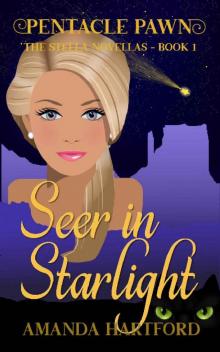 Seer in Starlight
Seer in Starlight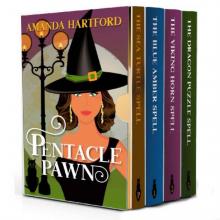 Pentacle Pawn Boxed Set
Pentacle Pawn Boxed Set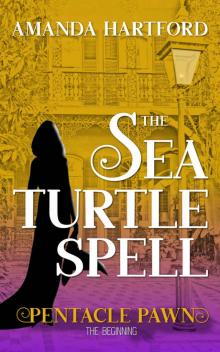 The Sea Turtle Spell
The Sea Turtle Spell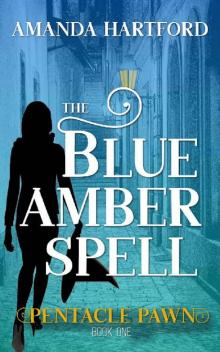 The Blue Amber Spell
The Blue Amber Spell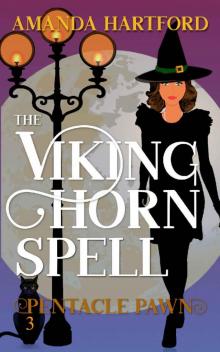 The Viking Horn Spell
The Viking Horn Spell